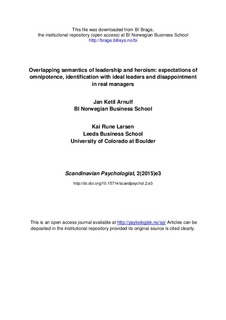Overlapping semantics of leadership and heroism: expectations of omnipotence, identification with ideal leaders and disappointment in real managers
Journal article, Peer reviewed
Permanent lenke
http://hdl.handle.net/11250/281512Utgivelsesdato
2015Metadata
Vis full innførselSamlinger
- Scientific articles [2181]
Sammendrag
People may confuse leadership with heroism due to the semantic overlap between their descriptions. This may explain some facets of fascination with leadership and obstructions to differentiated viewpoints of leadership as a group phenomenon. Building on the semantic theory of survey response (STSR), we are able to show how prevalent measures of charisma and transformational leadership are semantically tied to concepts of heroic behaviours and qualities. Due to the semantic overlap between heroism and leadership (outlined in the classic works of Carlyle, Weber and Burns), we hypothesized, and found, that many people have unrealistic expectations of leaders. Heroic expectations seem to be linked to representations and ideals of the self, which may create notable derogatory attitudes towards actual managers. Correlations with age suggest that experience will reduce this tendency. An STSR analysis shows how leadership research is vulnerable to semantic overlaps in central concepts. Possible explanations and consequences are discussed.
Beskrivelse
This is the originally published version of the article. The journal is Open Access, available at http://psykologisk.no/
